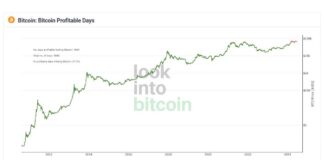Institutional investors have significantly increased their holdings in US-traded spot Bitcoin exchange-traded funds (ETFs), now accounting for about 20% of all BTC ETFs in the country. According to recent data from 13F Form filings, institutional investors currently have over 193,000 BTC invested in Bitcoin ETFs as of October 18th. This marks a considerable increase in institutional interest and participation in the cryptocurrency market.
A total of 1,179 institutions have invested in US-traded spot Bitcoin ETFs, including major players like Millennium Management, Jane Street, and Goldman Sachs. Among the various ETFs available, BlackRock’s iShares Bitcoin Trust ETF (IBIT) holds the largest amount of BTC with over 71,000 Bitcoins. However, its institutional adoption percentage of 18.38% is below the average compared to other ETFs.
Grayscale’s GBTC follows closely behind with 44,707.89 BTC held by institutional investors, representing 20.25% of its shareholders. On the other hand, ARK 21Shares’ ARKB stands out with the highest institutional participation at 32.8%, equivalent to around 17,166 BTC. In contrast, Grayscale’s Bitcoin Mini Trust has the least institutional participation at just 1.52% of its shares.
Fidelity’s FBTC, the third-largest ETF, is also a popular choice among institutional investors, with 44,623.23 BTC held by this group, making up 24.14% of its holders. The increasing institutional interest in Bitcoin ETFs has been linked to a stronger correlation between ETF flows and the cryptocurrency’s price in recent months, as highlighted in a recent report by VanEck.
The surge in institutional interest may have contributed to Bitcoin’s 11% price increase in October, reaching $67,478. The asset manager suggests that the growing demand from institutions could continue to drive Bitcoin’s price upward in the near future. Overall, the data reflects a growing trend of institutional adoption and investment in the cryptocurrency market, indicating a shift towards mainstream acceptance and integration of digital assets into traditional investment portfolios.

















